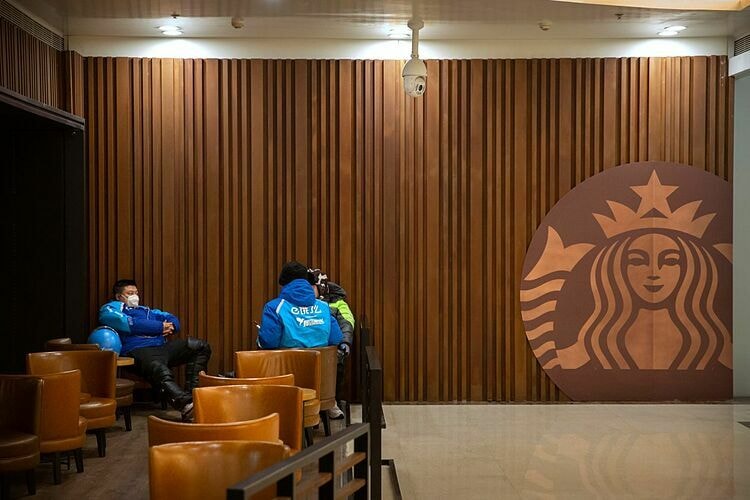Foreign companies in China struggle with Wuhan flu epidemic
Multinational businesses, already struggling because of the trade war, are now having their operations disrupted by the pandemic.
With more than 57 million people in nearly 20 Chinese cities under lockdown, the Wuhan pneumonia epidemic is severely affecting retail, tourism and transportation in China, especially during the Lunar New Year.
Starbucks announced last week that it would close stores and suspend delivery services in Wuhan, the epicenter of the outbreak, and the entire Hubei province. The coffee chain has 90 stores there. In total, Starbucks has closed more than half of its stores in China, its second-largest market. Analysts at William Blair warned that this could cost the company $25 million in lost revenue per week.
 |
| A Starbucks store in China. Photo:AP |
Several fast-food chains have also closed restaurants in Wuhan. The parent company of both fast-food chains, Yum China, said it would continue to assess the situation and take “further action” as needed.
McDonald's has closed its locations in Wuhan and four other cities in Hubei. Disney has closed its theme parks in Shanghai and Hong Kong, despite having carefully prepared decorations, services and merchandise ahead of the Lunar New Year.
Tesla is also struggling to meet its goal of ramping up production at its Shanghai factory. Its first-quarter profits could fall as Tesla bets big on the Chinese market.
The flu pandemic is adding to the pressure on foreign companies in the country, which are already facing many challenges. For nearly two years, multinational companies have been struggling because of the US-China trade war. Even before the war broke out, they had to reconsider their strategies in China.
Rising labor costs, increasingly fierce local competition, and an unfriendly regulatory system have made many businesses hesitant. However, the abundant labor force, convenient highway and rail systems, and large consumer market make it difficult for them to leave the country.
"What's very clear here is that businesses are facing a lot of uncertainty. And this is just one more risk," said Sameer Samana, global market strategist at Wells Fargo Investment Institute.NYT.
Jude Blanchette, director of China studies at the Center for Strategic and International Studies in Washington, said the outbreak came at “arguably the worst time for China.” Lunar New Year is “the single largest economic event in China, with about $150 billion spent each season. So the economic impact could be huge,” he said.
Luxury stocks have been hit hard recently by investors’ concerns about weak sales during what is supposed to be a busy holiday shopping season. LVMH, Kering and Richemont all fell more than 5% last week. China is a lucrative market for these companies.
The Lunar New Year is also a time when hundreds of millions of Chinese travel back to their hometowns. The flu epidemic has caused millions to cancel their travel plans. Total trips in China on the first day of the Lunar New Year fell nearly 30% compared to last year, said Liu Xiaoming, China's vice minister of transport. Train and plane trips fell more than 41%.
Major hotel chains such as IHG, Marriott and Accor said they would waive cancellation fees until February 8 for hotels in China. China accounts for 6% of Hilton Worldwide’s rooms and 8.5% of Marriott’s. Airlines such as Cathay and Qantas said they would offer full refunds to customers booked to or from China through the end of February.
"Our members are facing multiple levels of business disruption, including supply chain issues, factory and store closures and other challenges. If travel bans and quarantines continue, these issues will only get worse," said Jake Parker, vice president of the US-China Business Council.
Wuhan, the epicenter of the outbreak, is particularly attractive to large companies because it is a major transportation hub in China. Auto giants such as General Motors, Honda, and Nissan all have stores there. Wuhan is also home to more than a third of French investment in China.
Renault, one of the carmakers with a major plant in Wuhan, said last week it was “studying the issue carefully.” Many car factories have closed for the holidays. Peugeot said last weekend it would evacuate employees and their families from Wuhan.
Japanese companies are also assessing the impact of the flu outbreak. "If this situation continues, we are concerned it will affect exports, output and profits of Japanese companies," Yasutoshi Nishimura, Japan's economic and fiscal policy chief, said this week. Chinese tourists account for about 30% of foreign visitors to the country. Chinese companies are also major buyers of components from Japan, such as semiconductors and lenses.

